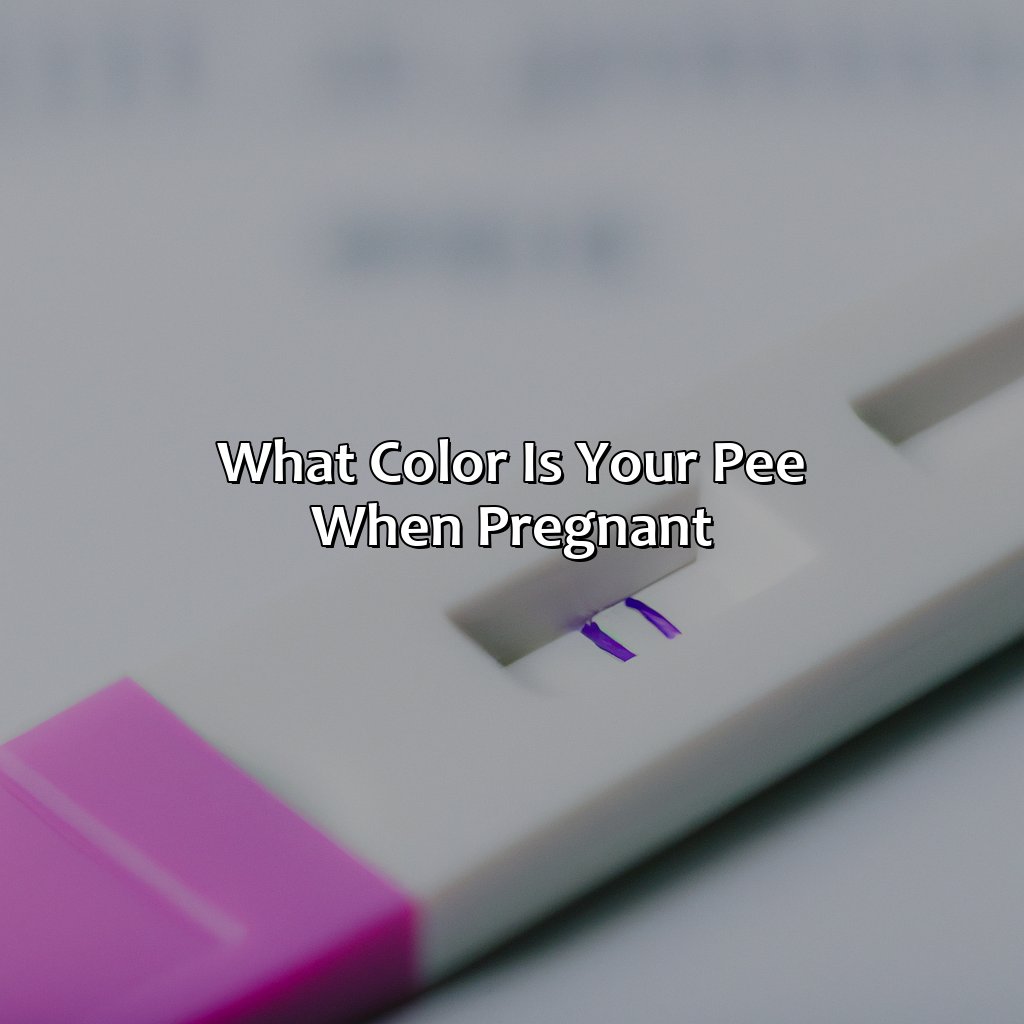Key Takeaway:
- Urine color during pregnancy can indicate hydration levels: Pregnant women should aim for clear or pale yellow urine to ensure proper hydration and overall health. Darker urine can indicate dehydration and the need for more fluids.
- Urine color can also be affected by diet and supplements: Orange or dark urine can be caused by certain foods or supplements, while yellow or clear urine can be a result of high water intake or vitamin/mineral supplements.
- Abnormal urine colors during pregnancy should be addressed with medical attention: If urine appears red, pink, green, or very dark, it could indicate underlying medical conditions such as urinary tract infections or pre-eclampsia, and medical attention should be sought immediately.
Importance of urine color during pregnancy
Understanding the hue of urine color is an important aspect for pregnant women, as it can provide crucial insights into their hydration status and overall health and wellness. The kidneys and bladder play a significant role in the elimination process, thereby reflecting signs of possible dehydration or other underlying medical conditions. Pregnant women often experience color changes in their urine due to various factors such as vitamins and supplements, medications, food and drinks intake, or even certain medical concerns.
Moreover, monitoring urine color regularly is paramount for illustrating any visible changes indicative of a urinary tract infection or pre-eclampsia. However, seeking medical attention should depend on additional accompanying symptoms such as pain during urination or lower abdominal discomfort besides concerning colors. Research has suggested that yellow urine during pregnancy signifies light dehydration levels, which could lead to complications if not addressed timely.
A true fact stated by the American Pregnancy Association suggests that excessive fluids intake may cause clear urine during pregnancy and hence emphasizing water balance throughout this vital phase is necessary.
Pregnancy brings a whole new meaning to ‘colorful’ language – especially when it comes to your pee.
Common urine colors during pregnancy
Fancy knowing the typical hues of urine during pregnancy? “What Color Is Your Pee When Pregnant?” is the article for you! It covers the various colors of urine during pregnancy.
Clear pee, yellow pee, orange pee, dark pee, red or pink pee, green pee, and blue pee are all explained. For each color, the article will discuss the potential causes, symptoms, and risks pregnant women should be aware of.
Clear urine
During pregnancy, clear urine is a common and healthy indicator of adequate hydration and water intake. It means that the body’s kidneys are functioning properly and eliminating waste products efficiently. Adequate hydration during pregnancy helps prevent urinary tract infections, constipation, and pre-eclampsia. However, it’s important to note that clear urine can also be a side effect of excessive fluid intake or certain vitamin supplements.
It’s important to maintain a balance between hydration and fluid intake. While maintaining proper hydration through water intake is necessary, excessive drinking can cause hyponatremia or water intoxication that is dangerous for you and your unborn baby.
In addition to water intake, vitamins, minerals, and supplements intake may also influence urine color. Prenatal vitamins and supplements like iron tablets can give the urine a yellow or orange tint. Furthermore, some medications prescribed during pregnancy like antibiotics may temporarily turn your urine dark yellow.
A friend of mine was pregnant last year, she faced difficulty while trying to control her urge to pee frequently due bladder incontinence problems caused by slight pressure on the bladder from increased belly size with advancing pregnancy. She learned how to do pelvic floor exercises as advised by her doctor which helped manage this common problem during pregnancy.
Peeing yellow during pregnancy? Drink more water or your baby will be born with a tan.
Yellow urine
Urine color during pregnancy can provide valuable insights into one’s overall health. When it comes to yellow urine, this is the most common and normal color expectant mothers will see. The shade can range from light to dark depending on hydration levels and urinary output. It may contain bubbles, which are a sign of protein leakage or dehydration. A higher intake of vitamins and minerals (especially vitamin B2) can result in bright yellow urine.
It’s important to maintain proper hydration throughout pregnancy as dehydration can lead to darker urine. Water intake should be monitored regularly particularly during hot weather or when engaging in physical exercise. Additionally, taking supplements like iron or multivitamins can alter urine color too.
Pro Tip: Check your urine from time to time, especially after taking a supplement or new medication so that changes in color can be quickly addressed.
Orange urine during pregnancy? Looks like someone went heavy on the Cheetos and skipped the water bottle.
Orange urine
The color of urine during pregnancy can be affected by several factors. One such color variation is a yellow-orange hue, which could indicate dehydration and a need for more water intake. Furthermore, if an excessive amount of vitamins or supplements are consumed, it can also lead to orange urine. Eating certain foods rich in beta-carotene, such as carrots or sweet potatoes, may also cause orange urine. It is important to maintain a balanced diet and proper hydration during pregnancy while monitoring changes in urine color.
During my nursing training, I had a patient who had been experiencing orange-colored urine throughout her pregnancy. Upon further examination, we discovered that she had been consuming high amounts of vitamin C supplements without consulting with her healthcare provider. After adjusting her intake of vitamins and minerals and increasing her water consumption, the color of her urine returned to normal within a few days.
Don’t let your pee be as dark as your humor – stay hydrated with plenty of water and essential vitamins and minerals.
Dark urine
During pregnancy, it is not uncommon to experience dark urine. This could be an indication of dehydration, which may result from low water intake or excessive sweating. Insufficient intake of vitamins and minerals through diet or inadequate supplements can also cause dark urine. Additionally, certain medications can affect the color of your urine.
Moreover, other factors such as the consumption of certain foods and drinks can lead to darker urine during pregnancy. While this change in color may be due to benign reasons as mentioned above, it is essential to seek medical attention if this persists for a prolonged period.
I remember a friend who experienced dark urine during her third trimester, despite increasing her water intake. Her doctor detected pre-eclampsia early on through her urine test and was able to provide prompt treatment. It is essential always to communicate any changes in your urinary secretion with your healthcare provider immediately for proper evaluation and management.
Seeing red while pregnant? Don’t ignore it, a quick visit to the doctor can prevent a UTI from turning into something more serious.
Red or pink urine
The urine color during pregnancy can offer essential insights into the mother’s overall health and well-being. Red or pink urine indicates serious concerns and calls for prompt medical attention. This observation may indicate bleeding in the urinary tract, which may pose severe risks to both the expectant mother and her baby.
When a pregnant woman notices red or pink urine, she should not hesitate to visit her doctor promptly. The attending medical professional will carry out physical assessments, and if necessary, recommend further tests to ascertain the underlying cause of this symptom. This action is vital since failure to seek appropriate medical care may result in severe complications such as miscarriage or low birth weight.
It is crucial to note that certain preventative measures help minimize urinary tract infections (UTIs) and mitigate their symptoms. Pregnant women should maintain good hygiene by wiping from front to back after using the restroom. Drinking plenty of water and urinating regularly may also help flush out bacteria from the urinary tract. Additionally, regular prenatal visits ensure that any underlying medical conditions that might cause abnormal urine colors are detected early before they escalate into more significant threats.
Looks like your urinary tract got a Guacamole party invitation during pregnancy, time for some antibiotics.
Green urine
The color green in urine during pregnancy may indicate a bacterial infection in the urinary tract. This is caused by a type of bacteria known as Proteus, which produces an enzyme that reacts with urine and turns it green. Other symptoms of a urinary tract infection (UTI) include painful urination, frequent urination, and lower abdominal pain. UTIs can be treated with antibiotics, and it’s important to seek medical attention as they can cause complications for both the mother and baby if left untreated. Don’t ignore this symptom – contact your healthcare provider immediately to ensure proper treatment.
Feeling blue about your glove color after a urine test? Don’t worry, pH levels and acidity/alkaline levels can affect color, but always seek professional opinion for diagnostic testing and medical advice.
Blue urine
Urine with a blue hue can be noticed during pregnancy. This discoloration is usually caused by consuming food and drinks with artificial coloring or taking certain medications. It may also indicate an underlying medical condition that requires medical attention. When experiencing blue urine, it’s important to seek professional advice from your healthcare provider to obtain a proper diagnosis through diagnostic testing including urine tests and pH level measurement for acidity and alkaline balance.
Pro Tip: If you are concerned about your urine’s unusual color during pregnancy, do not hesitate to consult your healthcare provider for a professional opinion and guidance on what steps to take next.
Pregnancy: when your bodily fluids become a mood ring for all the factors affecting your color-changing pee.
Factors affecting urine color during pregnancy
To know more about urine color during pregnancy, we’ll explore various factors that may contribute. Dehydration, vitamins, supplements, medications, food and drinks, and medical issues can all influence the color. Each of these topics will be discussed briefly and how they can affect urine color while pregnant.
Dehydration
Adequate hydration is vital for a healthy pregnancy. Low levels of water intake may result in dehydration, which can affect the color of your urine during pregnancy. Dehydration may cause your urine to be darker in color, and it may also have a strong odor or be cloudy. It is important to keep yourself hydrated by drinking enough water throughout the day.
If you are experiencing dehydration, it is essential to seek medical attention promptly. Dehydration can lead to several health issues, such as dizziness, headaches, and even preterm labor. Therefore, maintaining adequate hydration levels throughout pregnancy is important.
It is recommended that pregnant women drink eight to ten glasses of water each day. Besides drinking plenty of water, consuming high-water-content foods like fresh vegetables and fruits can also improve hydration levels.
In my recent visit with my obstetrician-gynecologist (OB-GYN), she warned me about the importance of adequate hydration during pregnancy and how dehydration can cause harm both myself and my baby’s health. She emphasized that I should avoid sugary drinks and caffeinated beverages and instead focus on increasing my water intake for better overall health during this important time in my life.
Taking too many vitamins can turn your pee into a neon sign for 'I'm overdoing it'.
Vitamins and supplements
Vital Nutrients and Supplemental Intake
The role of diet, nutrition, vitamins, minerals, and supplements is significant during pregnancy. Here are six facts to strengthen the importance of their intake.
- Supplements that contain iron can turn urine color into dark yellow or orange.
- Vitamin C may exhibit diuretic effects causing frequent urination and clear colored urine.
- Drinking cranberry juice is known for preventing urinary tract infections but can change the urine’s color to red or pink.
- Vitamin B variants can cause bright yellow urine color.
- Prenatal vitamins with calcium carbonate content may result in green colored urine.
- Multivitamins with riboflavin levels curiously change urine color to neon yellow.
It’s essential to note that too much supplementation without medical advice is dangerous for both mother and fetus. Urine could become darker than normal when an excess is present in the bloodstream.
A unique detail worth mentioning is that water-soluble vitamins like vitamin C and B complex vitamins are typically excreted in excess from the body through urination.
According to a source from Harvard Health Publishing, taking multivitamin supplements containing more than 100% of the daily value (DV) of certain nutrients can cause serious health problems, including birth defects.
As expectant mothers contemplate what goes into their body daily, it’s imperative to have sufficient knowledge of healthy practices. By including balanced diet plans rich in vitamins and nutrients to improve maternal wellbeing, enriching fetal growth results as well. Prescription or OTC, your meds may turn your pee into a rainbow, but trust us, green or blue is not a good look.
Medications
Certain substances can affect urine color during pregnancy, including medications prescribed by a doctor or over-the-counter (OTC) drugs. Depending on the medication being taken, urine color may range from pale yellow to brown or orange due to metabolites in the drug. Some medications known to cause changes in urine color include laxatives, iron supplements, and certain antibiotics. It is important to discuss any concerns about medication side effects with a healthcare provider before taking them during pregnancy.
Pro Tip: Always check with your healthcare provider if you experience any unusual changes in urine color while taking prescription or OTC medications during pregnancy.
Watch out for those colorful smoothie bowls, they might have you mistaken for a unicorn in the bathroom.
Food and drinks
Dietary Factors that Impact Urine Color during Pregnancy
Urine color during pregnancy is greatly influenced by the food and drinks consumed by an expectant mother. Here are some factors to keep in mind:
- Consuming fruits and vegetables high in beta-carotene, such as carrots, sweet potatoes, and spinach, can cause urine to appear yellow or orange.
- B vitamins found in foods like meat, eggs, nuts, and seeds can cause urine to be bright yellow.
- Drinking plenty of water and other fluids helps maintain clear urine color and reduce dehydration-related issues.
- Certain foods such as beets or blackberries contain pigments which may temporarily turn urine pink or red.
- Caffeinated drinks like tea or coffee have diuretic properties which may affect urine production.
It’s worth noting that the effects of diet on urine color may vary depending on individual circumstances such as pre-existing medical conditions. Always consult a doctor if pregnant women are experiencing unusual symptoms.
I knew a nursing mother who was concerned about her neonate’s hydration level because of the baby’s dark-colored urine. The pediatrician reassured her that sometimes a breastfeeding mother’s milk can directly influence the color of her infant’s waste products – so it turned out to be a false alarm!
Pregnancy – the only time when ‘yellow’ can make you feel blue.
Medical conditions
Various health conditions can affect urine color during pregnancy. These medical conditions range from kidney or liver disease to dehydration and urinary tract infections. Pregnant women should be vigilant about their urine color as it reflects their overall health.
In addition to the factors discussed earlier, several medical conditions can alter urine color during pregnancy. Gestational diabetes, cholestasis of pregnancy, and preeclampsia are a few such medical conditions that can cause changes in urine color. It is essential to monitor urine color early on because untreated medical conditions can lead to severe complications later on.
As with all things related to health, prevention is better than cure when it comes to medical conditions impacting urine color during pregnancy. Managing underlying medical issues like hypertension or gestational diabetes timely can prevent more severe complications and lead to healthier outcomes for both mother and baby.
Recently, a pregnant woman who found her urine turning brown was diagnosed with acute fatty liver with HELLP syndrome (hemolysis, elevated liver enzymes, low platelet count). The condition significantly improved with prompt delivery of the baby via C-section and appropriate medication administration after birth.
If your pee turns into a rainbow, it’s time to seek medical attention during pregnancy.
When to seek medical attention
Check your urine when pregnant. Notice the color – is it normal? If not, plus any other symptoms, see a doctor. Pregnant women have a higher risk for urinary tract infections. Quick medical attention prevents this. Pre-eclampsia is another danger to watch for. It can cause problems for both mother and baby, and even premature birth.
Abnormal urine colors
Abnormal Color Changes in Urine During Pregnancy
During pregnancy, it is common to experience changes in urine color. While some changes are normal, others may indicate abnormalities and require medical attention. Here are five abnormal urine color changes that can occur during pregnancy:
- Brown or dark brown urine: This may indicate liver or kidney problems, dehydration and infections.
- Milky white urine: This could be a sign of an infection such as yeast or bacterial vaginosis.
- Red or pink urine: This indicates blood in the urine which could be a sign of an infection, kidney stones and other medical conditions.
- Greenish-colored urine: This could be related to infections such as UTIs or sexually transmitted diseases which require immediate treatment.
- Foamy/ bubbly urine: This requires medical attention since it’s usually caused by excess protein excretion in the urine.
If you experience any of these abnormal color changes, along with other accompanying symptoms such as pain while urinating, frequent urination, and discharge, then you should seek prompt medical attention from an OB-GYN.
To prevent such abnormal color changes, increase your water intake to reduce dehydration risk. Also ensure that you maintain good sanitation and cleanliness practices to lower the risk of urinary tract infections and other bacterial infections.
Be sure to visit your doctor if your pee looks like a Jackson Pollock painting, and you experience any accompanying symptoms during pregnancy.
Other accompanying symptoms
When observing urine color during pregnancy, it’s essential to keep an eye out for any accompanying symptoms. Pregnant women should report any abnormalities to their doctor immediately. Symptoms such as pain during urination, blood clots, swelling in the legs or hand, and sudden weight gain are significant risks that require urgent medical attention. It’s imperative not to ignore these symptoms as they might be signs of underlying issues like a urinary tract infection or pre-eclampsia.
In addition to physical symptoms, pregnant women should also look out for behavioral changes like increased thirst or decreased urine output. These behavioral changes may indicate dehydration and should prompt a visit to the doctor. Moreover, medication side effects can also cause abnormal urine colors and accompany symptoms; therefore, discussing medications taken is essential when reporting any abnormality.
It’s crucial to remember that every woman’s pregnancy journey is unique; consequently, unusual urine colors and accompanying symptoms do not always mean something serious is happening. However, regular check-ups with your doctor throughout the pregnancy should help alleviate fears or spot potential problems early before they become severe.
According to the American Pregnancy Association (APA), “a dark brownish tint in your urine could be caused by liver disease.” Therefore, consulting a physician is always necessary concerning suspicious bodily reactions.
I would never wish a urinary tract infection on my worst enemy, let alone a pregnant woman.
Urinary tract infections
One of the most common medical conditions that pregnant women face is an infection in their urinary system or Urinary Tract Infections (UTIs). UTIs are bacterial infections that occur either in the bladder, kidneys or urethra. Pregnant women are more susceptible to this because of physiological changes during pregnancy. Symptoms include pain while urinating, frequent urge to urinate even when nothing comes out, abdominal and lower back pain. Untreated UTIs have several risks including premature delivery, low birth weight, and preeclampsia. Doctors advise on prevention by cleaning front to back, staying hydrated and avoiding douches. Treatment requires antibiotics based on severity and blood tests may be done to check for further complications.
Pregnancy cravings might make you want to pee more, but hypertension and pre-eclampsia could make pee a sign of danger.
Pre-eclampsia
During pregnancy, changes in hormonal levels can lead to noticeable effects on the urinary system. As a result, urine color can provide insight into maternal health and fetal well-being. In severe cases, certain colors could indicate complications such as hypertension or preeclampsia.
Pregnant women should attend regular prenatal checkups that include urine analysis to ensure proper maternal health and fetal growth.
Hypertension during pregnancy is linked to pre-eclampsia, a serious condition that requires medical attention. Symptoms such as high blood pressure, headaches, nausea, and vomiting could be indications of pre-eclampsia. Urine tests may show abnormal results such as proteinuria or elevated liver enzymes.
In instances where pre-eclampsia becomes severe, premature birth or fetal distress may occur and require neonatal care. Therefore, it is important for expectant mothers to recognize signs of high blood pressure and discuss them with healthcare providers during prenatal checkups.
Some Facts About “What Color Is Your Pee When Pregnant”:
- ✅ During pregnancy, the color of urine may appear darker or yellower due to increased levels of hormones, vitamins, and minerals in the body. (Source: Healthline)
- ✅ Dehydration may cause urine to appear more concentrated and darker in color, so it is important to drink enough water during pregnancy. (Source: Mayo Clinic)
- ✅ Some prenatal vitamins may also affect the color of urine. (Source: American Pregnancy Association)
- ✅ In some rare cases, dark or brown urine during pregnancy may indicate a serious medical condition and should be promptly evaluated by a healthcare provider. (Source: Verywell Family)
- ✅ It is normal for the color of urine to vary throughout pregnancy, but any sudden changes in color, frequency, or odor should be discussed with a healthcare provider. (Source: Pregnancy Birth and Baby)
FAQs about What Color Is Your Pee When Pregnant
What color is your pee when pregnant?
During pregnancy, the color of your urine may change due to a variety of reasons. It can be influenced by your hydration level, diet, medications, and even the hormonal changes happening in your body. However, the most common color of urine during pregnancy is yellow.
What does it mean if my pee is a different color when I’m pregnant?
If you notice that your urine is a different color than usual, such as dark yellow, brown, red, or green, it could be a sign of an underlying medical condition. For example, dark urine can indicate dehydration, while red or brown urine can be a sign of a urinary tract infection or other serious health issue. It’s important to talk to your doctor if you experience any abnormal urine colors.
Why does my pee smell different when I’m pregnant?
During pregnancy, changes in hormones and diet can cause your urine to smell differently than usual. For example, consuming certain foods like asparagus or coffee can give your urine a stronger odor. Additionally, pregnancy hormones can alter your body’s pH levels, leading to a more noticeable urine scent.
Is it normal to have cloudy urine during pregnancy?
Cloudy urine during pregnancy can be a sign of a urinary tract infection, which is more common during pregnancy due to changes in the urinary system. However, it can also be caused by dehydration or a buildup of body waste products. If you are concerned about cloudy urine, it’s best to talk to your doctor.
What should I do if I notice blood in my pee while pregnant?
Seeing blood in your urine during pregnancy can be alarming. It can indicate a urinary tract infection, kidney infection, or even a miscarriage. It’s important to contact your doctor right away if you notice any blood in your urine.
How much should I be peeing when pregnant?
Pregnant women often have to urinate more frequently than usual due to the pressure of the growing uterus on the bladder. However, the amount of urine you produce can vary depending on several factors, including your fluid intake and the stage of your pregnancy. On average, pregnant women should aim to drink 8-10 glasses of water a day and urinate every 2-3 hours.






